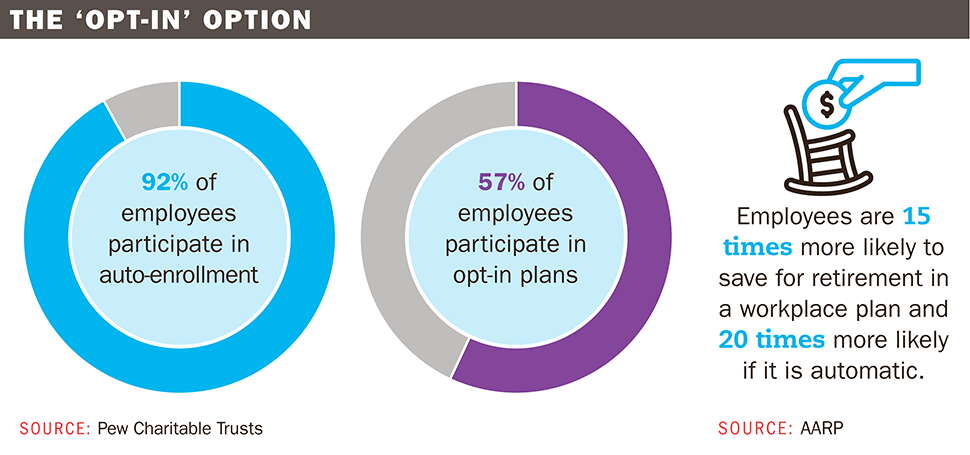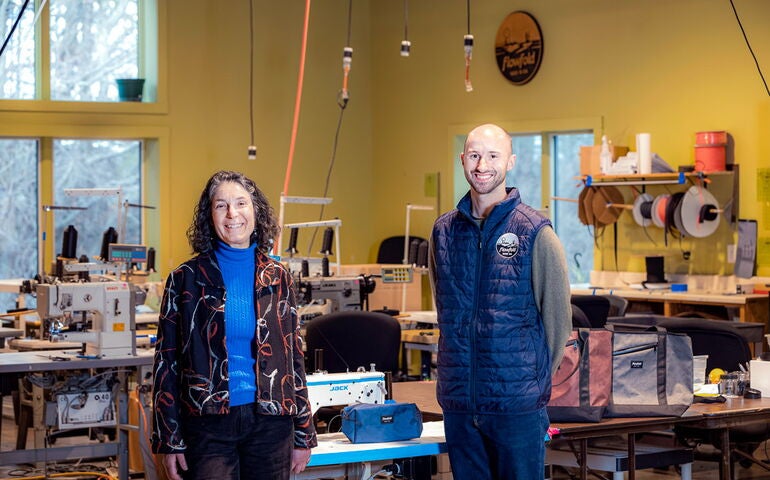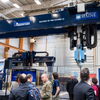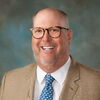
Filling a gap: Maine launches retirement savings plan for private-sector workers without one
 Photo / Tim Greenway
Elizabeth Bordowitz, executive director of the Maine Retirement Investment Trust, says Maine’s program for private-sector retirement savings builds on similar programs in other states. Flowfold’s Devin McNeill jumped at the chance to enroll his company in the pilot program last fall.
Photo / Tim Greenway
Elizabeth Bordowitz, executive director of the Maine Retirement Investment Trust, says Maine’s program for private-sector retirement savings builds on similar programs in other states. Flowfold’s Devin McNeill jumped at the chance to enroll his company in the pilot program last fall.
Last fall, Devin McNeill jumped at the chance to enroll his company in a state-run pilot program offering Maine employers an automatic retirement savings program for their employees.
As the program promised, enrollment was easy and free, says McNeill, CEO and cofounder of Flowfold, a Gorham maker of wallets, bags and other outdoor gear from sustainable materials such as recycled sailcloth. “It was a white-glove process,” he says.
McNeill and cofounder Charles Friedman had wanted to offer a retirement plan for employees from the company’s start in 2010.
“It was always something that we wanted to do, but we just didn’t have the right solution,” McNeill says.
Last year, he read that the state would be rolling out the Maine Retirement Investment Trust, or MERIT, in a first-of-its-kind partnership with a similar program in Colorado, to provide a low-cost, portable retirement savings program to workers without access to a savings program.
“The way MERIT was structured was very appealing to us,” says McNeill. “It has very straightforward investments.”
200,000 employees
MERIT was established when the Maine Legislature and Gov. Janet Mills created a law in 2021 and a subsequent amendment that set the expectation that employers with five or more workers, and not offering a qualified retirement savings plan, must begin using MERIT in 2024.
Elizabeth Bordowitz, former CEO of the Finance Authority of Maine, was appointed executive director last October and was tasked with conducting a national review of established state retirement savings programs to identify best practices and potential private and public partners.
“States like Oregon, Illinois and California have paved the way over the past five years as they developed efficient systems and built enrollment in their retirement saving programs,” Bordowitz says.
Colorado had recently established a similar program called SecureSavings. A partnership agreement with Colorado, signed last August, helps Maine to offer a cost-friendly, state-run retirement program for workers who don’t have access to a retirement savings program.
The goal is to increase the number of Mainers saving for retirement. The partnership also helps to decrease fees for Coloradan savers.
“We are excited to be working with Colorado SecureSavings to deliver a proven automatic savings program that follows employees throughout their careers while being easy and free for participating Maine employers,” says Bordowitz.
By late December, Colorado’s program had nearly 12,000 registered employers.
Vestwell, a digital 401(k) recordkeeping platform in New York City, in partnership with the Bank of New York Mellon Corp., serves as the program administrator, providing recordkeeping, custodial and administrative services to employers and employees in Maine and Colorado. MERIT is overseen by a public board whose members are appointed by the governor and confirmed by the legislature.
The program is anticipated to reach 200,000 Mainers, or about 40% of the state’s private-sector workforce. There is no cost and minimal administrative requirements for employers, and no requirement for an employer match.
All covered employees will be enrolled and have 5% of their paycheck automatically contributed to a Roth IRA account.
MERIT will also allow voluntary enrollment for workers not employed by covered employers and self-employed individuals.
There are certain deadlines for employers to enroll. Organizations offering 401(k)s and other plans may be exempt but must still register with MERIT.
Successful pilot
“Overall, the pilot has gone very well,” says Bordowitz. “Employees with funded accounts are in 14 counties. Most of the learning was fixing small technical glitches.”
The pilot enrolled 16 employers and the program now has 169 funded accounts. Employers ran the gamut, from a land trust to in Ogunquit to a day care company in Presque Isle.

“We’ve got some retail establishments, some hospitality establishments, some cannabis companies, residential health care providers, small manufacturers,” she says. “They’ve been looking for ways to offer benefits to their employees.”
Companies with fewer than five employees have also signaled their interest, but at present there’s no state-run option for them, she notes.
“There’s a lot of interest from employers who want to provide this for their employees,” she continues. “It’s good for their employees and it helps retain employees. This is an easy way to start.”
The full program rollout begins this month. At the time of this article’s publication, it was expected that notification emails and hard letters would go out to employers on Jan. 17.
After an employer registers with MERIT, all employees will receive information about the program and an invitation to open their online MERIT account. Employees can choose how much to deduct from each paycheck for their retirement savings, how their funds will be invested, or to opt out.
If an employee does not take any action, an account will be opened for them and 5% of their earnings will be deposited into their MERIT account each pay period. An employee can make changes any time.
75% participation
With about 9,600 employers to enroll, Bordowitz says she’s happy with the success of the pilot.
“The employers and employees I have spoken with have been very enthusiastic,” she says.
About a month into the program as a pilot enrollee, McNeill is encouraged by the 75% participation rate he’s seen among his 12 employees.
“I think retirement [savings] is something that everyone knows they want to do,” he says. “But it can be hard to get it going. This provides a very easy way.”














0 Comments